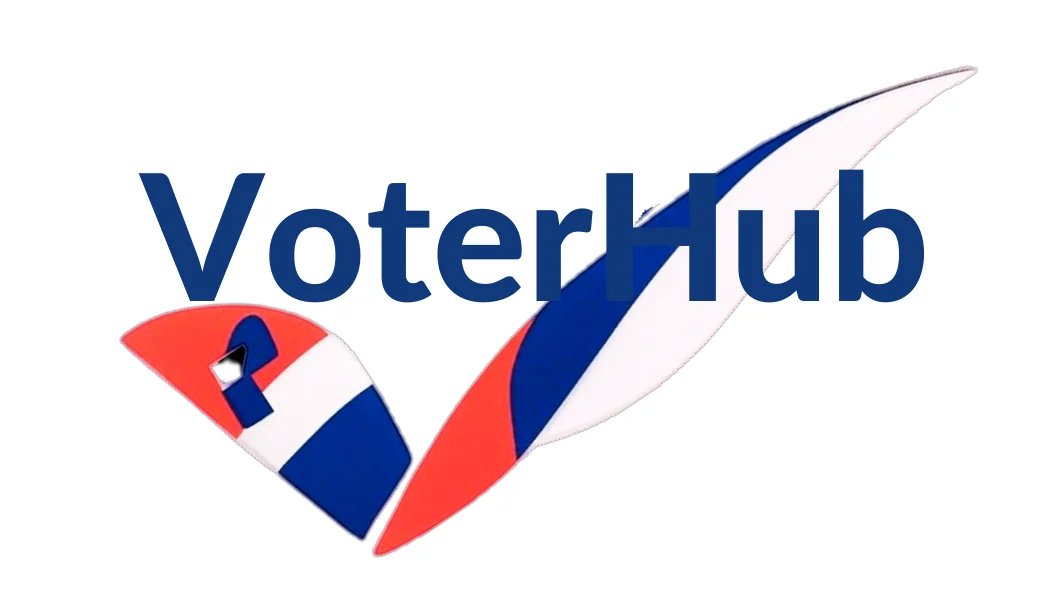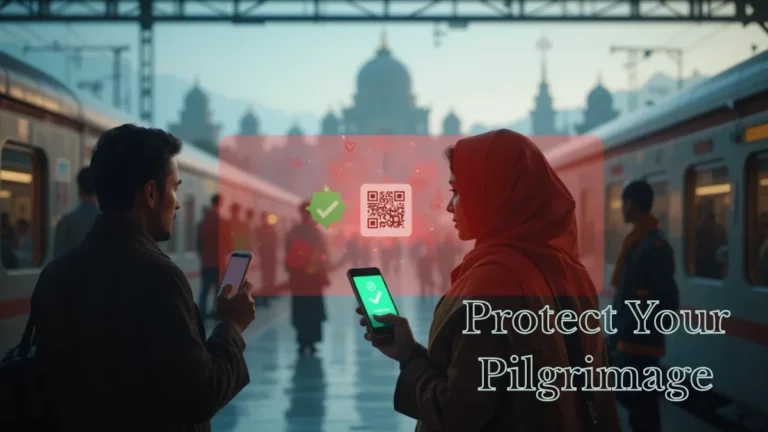Can We Trust Voting Anymore? 89 Million Say No!
Why Distrust Left 89 Million Home in 2024 and How to Fix It
Web3 Rescued You From
- 89 million Americans skipped voting in 2024—trust’s gone, and democracy’s slipping (U.S. News, prelim).
- Fraud fears choke us, hacked rolls sting, and states’ sloppy voter lists fuel doubt (NC’s 60,000 challenge, 2025).
- Long lines, lost IDs, and outdated systems leave 68% of voters craving tighter voter verification (Pew, 2024).
- Rural areas (10% broadband-less, FCC) and tech-shy Boomers (20%) risk missing out by 2026.
Web3 Rescued Insights
- How VoterHub on Hedera Hashgraph restores trust with secure, private voting for 193 million.
- Why Estonia and India prove decentralized IDs work—fast, clean, no hacks.
- The real challenges we face—rural access, skeptics, scale—and how we’ll overcome them by 2026.
- Why Web3 and decentralized IDs can save democracy now and expand to life’s data.
Voting is Broken — Time for a Revolution
I voted in ’76—proud, trusting.
Today? Fraud’s a ghost. Nobody trusts elections; hacked rolls and states’ sloppy voter lists sting. Eighty-nine million skipped 2024 (U.S. News), leaving faith in ashes. It hurts, and it’s wrong. North Carolina’s 60,000-ballot fight (NC Supreme Court, 2025) proves it; democracy’s slipping.
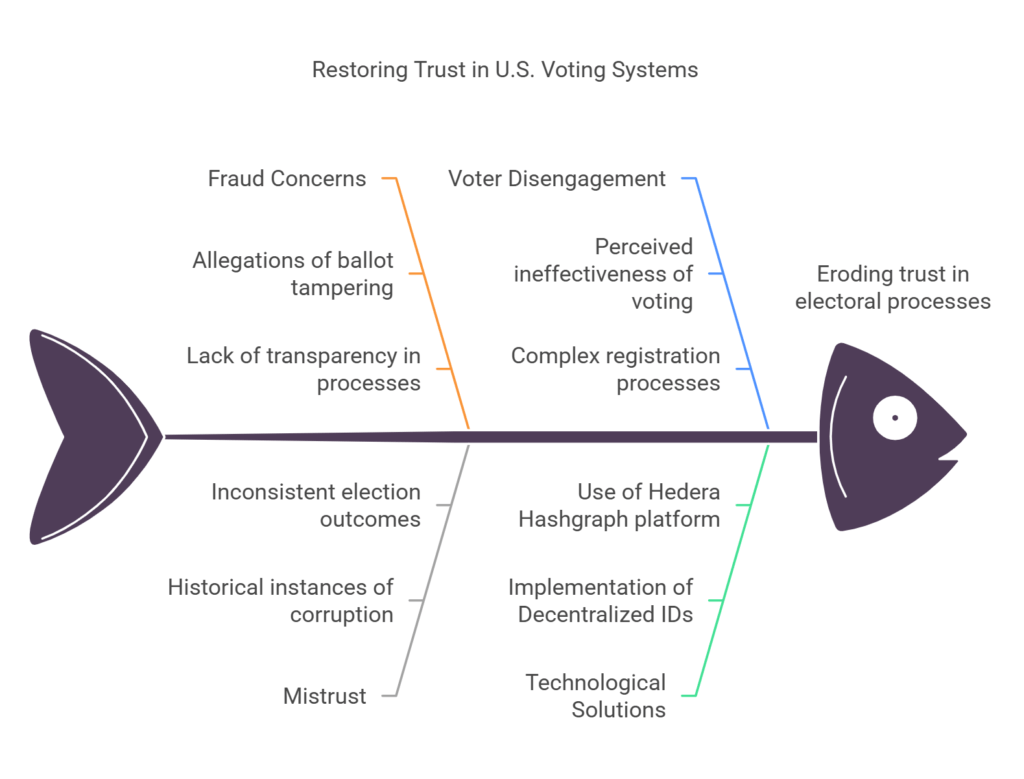
There is a solution. I propose to use Decentralized IDs (DIDs) on Hedera Hashgraph. Hear me out. The day is coming when every citizen will get a new Voter ID/registration. This Voter ID is unhackable and yours. Web3’s here, decentralized IDs (DIDs) are now—if I prove your vote’s counted, would you vote? I bet you, and 193 million more (80% of 241 million), would.
What the Heck Is Decentralized Identification for Voting?
What’s this Decentralized ID buzz? It is VoterHub on Hedera—no middlemen, no mess. You’ll own a tamper-proof Voter ID card or digital wallet, verified on Hedera’s hashgraph, like a driver’s license for democracy. Why? Voting is a wreck. The last election had 89 million no-shows (2024, U.S. News); trust is shot from fraud fears and hacked rolls. VoterHub fixes all of that fast.
Here’s how: you get a unique, encrypted digital identity—yours alone. Hedera logs it on its immutable, transparent, 10,000 TPS hashgraph, which is more secure than a vault. You get to vote online globally or in person at any of the 10,000 U.S. voting stations; zero-knowledge proofs hide your choice, no nosy poll workers peeking. It’s not using tech for tech’s sake. Web3 is solving distrust, putting 193 million back in the game quickly and fairly. Hedera’s $0.0001 per vote, batched online over 5 days, or stations at 0.21 votes/second, proves we’re ready. This isn’t a gadget; VoterHub is better than that.
Why We Need Decentralized Voter Registration
Voting is a disaster, and it’s killing democracy. In 2024, 64% showed up, and 155 million voted. More than 89 million stayed home (U.S. News, prelim). Why? Trust is gone. Hackers hit voter rolls, IDs vanish, and lines stretch for hours. Pew says 68% of us want tighter IDs, but doubts linger; 2020’s chaos still stings—60,000 ballots challenged in North Carolina alone (NC Supreme Court, 2025). It’s not just a glitch; it’s a crisis eroding democracy. That’s why we need VoterHub. Paper IDs and shaky systems can’t hack it. Decentralized IDs on Hedera stop hacks, restore access, and rebuild faith. No lines, no lost votes, and we go from 155 million voted to 193 million (80%) if we act now. I am not whining; I am solving a problem before apathy buries us or 2026 slips by. This isn’t tech for show—it’s saving our democracy, urgent as ever.
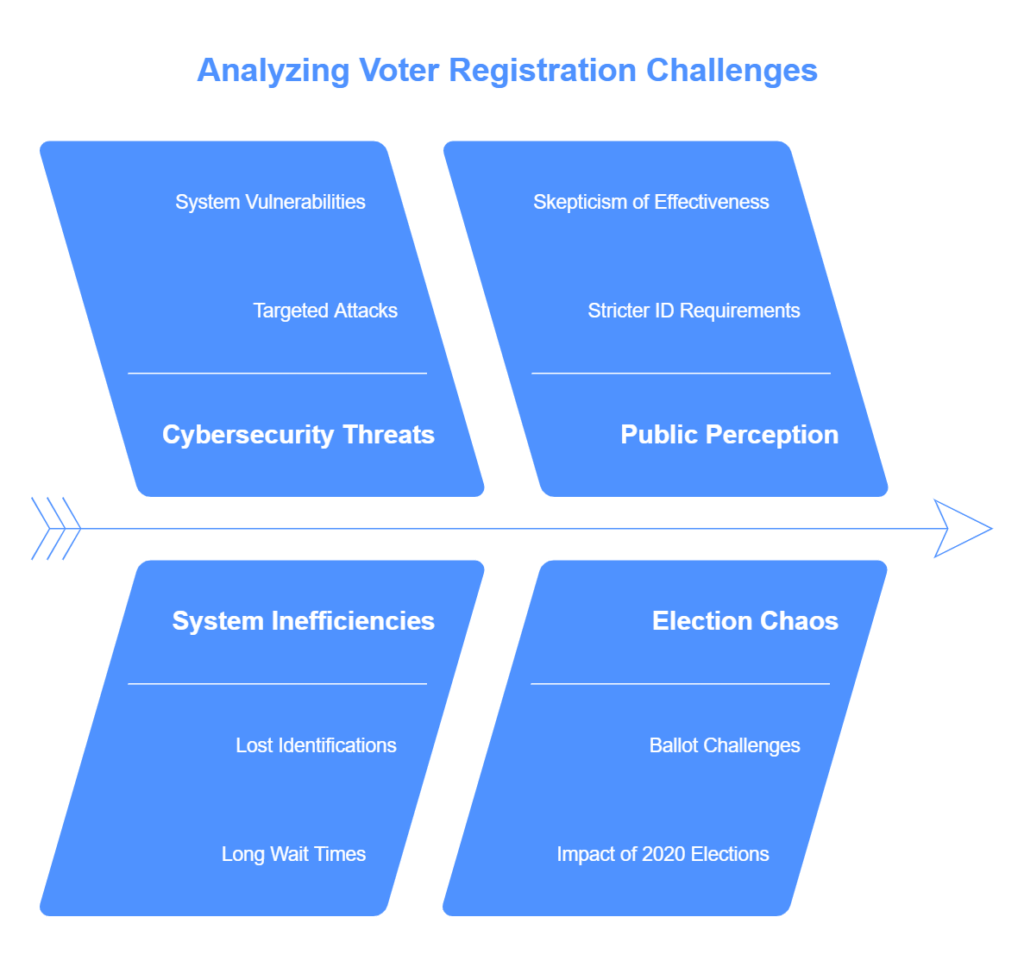
Who’s Doing It: Proof It Works
VoterHub’s no pipe dream—it’s for the people, and it’s working. Estonia’s led since 2005—51% voted online in 2023 with digital IDs, no fraud, and trust restored. Their 95% ID adoption proves it; turnout’s up because voters feel safe. India’s racing in—e-EPIC for 2025. Delhi elections give people digital IDs, hinting at blockchain’s power to cut fraud. Why is this a hit for us? Our trust’s shot, 89 million skipped 2024, X screams “rigged”, but these nations show VoterHub’s path: clean, secure votes.
We need to start to develop on Hedera’s platform. Create a group like “DemocracyGuard” to test our VoterHub concept on Hedera’s 10,000 TPS hashgraph. The unhackable, private, fast network for 193 million votes to process. This will be the proof that we can vote without a doubt, solving the apathy and the hacks. Other countries are ahead of us; we’re lagging, and it is time to catch up.
This isn’t a fix-it wish; it’s a model we can grab, bringing 241 million back in.
The Challenges: No Rose-Colored Glasses
Creating a VoterHub is no cakewalk. It is a fight, and we will face it head-on. Our trust in the current voting system is shot. X Theorists cry the election was “rigged”. But tech gaps hit hard. Rural areas (10%) lack broadband, according to the FCC. Back in 2021, Biden launched the Broadband Equity, Access, and Deployment (BEAD) program under the Bipartisan Infrastructure Law. This spent $42.5 billion to connect every American, especially rural folks, to high-speed internet by 2030. As of March 2025, not a single new home or business has been connected to broadband under BEAD. $42.5 billion and zero connections. WOW!
Then we have some Boomers, unlike me, who are tech-shy (20%) and may balk at getting with the new technology. How do 241 million get online? Scale’s tricky; the Hedera project of 10,000 TPS handles 2,658 TPS peaks (stations, online), but stations cap at 0.21 votes/second each. Skeptics fear hacks, despite zero-knowledge proofs—convincing them’s a slog.
Why is this so hard? It’s not; VoterHub solves distrust.
The Rollout will be the battle. We will need to ensure that rural centers get access, even if it is at traditional voting centers. There will need to be a nationwide education plan about decentralized Identification, a distribution plan, and patience. This isn’t a dream; we can make it happen, and nationwide voterID will be the champion to eliminate all distrust.
Why We Ditched Ethereum and Chose Between Solana and Hedera
When we first envisioned a national voting system using decentralized identification, Ethereum was our first look for the VoterHub. It is well established and secure, with 1000s of dApps created. For an anticipated 80% turnout of 193 million, it’s too slow—25 transactions per second (TPS) max, taking 89 days to process 193 million votes, using Layer 2 isn’t much help. Then you have spiking Gas Fees, which confuses Boomers like me. As a proponent for Web3, the mainstream entrance demands better for 2026.
Need For Speed
Ethereum is not the answer for this Voting Hub. Solana caught our eye—50,000 TPS, $0.00025 per vote, blazing fast (1.07 hours for 193 million). It’s cheap and stable, but wild swings worry me. Its 14 validator clusters feel less decentralized than we need for 241 million voters across this great nation. These validators are the computers that check and confirm votes (or transactions) are correctly counted and to ensure they’re real and secure. Talk about a potential bottleneck on the most important day of the year.
Hedera’s 10,000 TPS (5.36 hours), $0.0001 cost, lower than Solona, coupled with their tech council (Google, IBM, Dell, among others) ensure steady, unhackable votes. Hedera is private with zero-knowledge proofs, which is perfect for our VoterHub. I trust Hedera’s hashgraph over Solana’s blockchain and 14 bottlenecks. Hedera is secure and meets our urgent need for 2026.
Solana’s a beast, but Hedera’s our fix to restore faith for 193 million or more voters. This isn’t tech for show; it’s democracy’s lifeline, now.
Picture it: votes cast and locked in 5.36 hours, via voting stations or online. California’s month-long count ends here. No absentee ballots nor drop boxes are needed (onlinecsecure voting). Your new voter ID is all you need. Estonia’s voted online since 2005, and India’s testing it now. The VoterHub’s time is 2026, not later. Tech gaps and X skeptics won’t stop us, but we’ll fight for rural access and education fast.
One Decentralized ID = One Secure Vote
VoterHub’s time is now.
Beyond voting? Life being digitized is next. Act now.
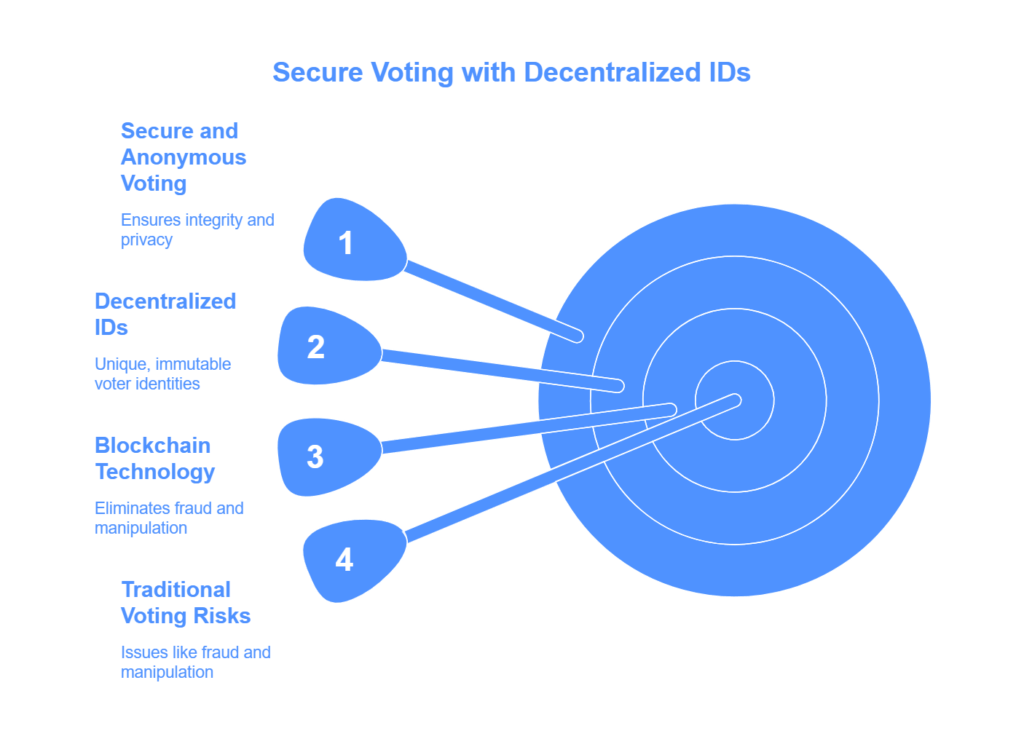
The Tech: How Hedera Pulls It Off
VoterHub’s tech isn’t fluff. Secure networks like Hashgraph on Hedera can handle our voting for years to come without compromise and a middleman. Your DID is in a wallet, verified on Hedera’s 10,000 TPS hashgraph vault for democracy. Hedera locks 193 million votes, secure and fast, and encrypted IDs and zero-knowledge proofs hide your vote—online or in stations, no snoops. Hedera’s hashgraph (not blockchain) is faster and fairer—$0.0001 per vote, batched online over 5 days and in voting stations at 0.21 votes/second. This isn’t sci-fi; it’s proof we can vote clean—unhackable, ours.
The Plan: Let’s Vote Now
VoterHub is ready to be built now! So let’s get these new voter IDs in the people’s hands fast. We register 241 million on Hedera—DOGE/USDS syncs SSA/Census/DMV data, and states issue DIDs via usa.gov. When it comes time to vote, rural centers help to get the votes collected. On the day of the Vote? 96.5 million hit 10,000 voting stations across the country (0.21 votes/second, 2,100 TPS) or vote online over 5 days (96.5 million, 558 TPS peak, batched ‘til close). Hedera’s 10,000 TPS clears 193 million in 5.36 hours—secure, private. I’d vote proud again—let’s make 2026 the year we win with new Voter Identification.
Beyond Voting: The Bigger Win
VoterHub is just the start. Trust is back, but life is next. After voting, DIDs tackle education (diplomas for 75 million), health records, and taxes. 350 million digitized identifications on other chains (Cosmos, Solana). Why? Hacks, silos, lost IDs—Hedera is proof of concept shows that we can. I v andted in ’76, simple—now, one ID secures it all. This isn’t a dream; it’s our future, one vote at a time.
Vote or Bust
This post and “VoterHub” are no gimmick. Web3 and decentralized identification are real. The idea pushing this solution is the simple fact that our Voting System is broken. How can we have 89 million no-shows for something as important as selecting the leader of the free world? Nearly 70% of the voting population supports some form of voter verification and registration. This is the solution that needs to gain speed.
Instead of putting the voting system in the hands of politicians on either side, why not. Put the process in our hands? Herera’s DIDs will fix our voting system once and for all. 193 million votes, secure, private, now. We register 241 million voters from scratch and clean ll of the voter rolls immediately. Tech gaps and skeptics won’t stop us. It is that important.
Beyond voting? Life digitized—our say, our way. Bug your representatives and demand VoterHub. This democracy’s ours. Let’s go!
People Also Ask (PAA)
1. Why did 89 million people skip voting in 2024?
Trust’s gone—hacked rolls, lost IDs, and long lines scared them off (U.S. News, 2024). X screams “rigged” and states’ messy lists (NC’s 60,000 fight, 2025) fuel doubt. I voted in ’76, proud—now it’s a mess. VoterHub on Hedera fixes this, secure and fast for 2026.
2. How does VoterHub on Hedera stop voting fraud?
VoterHub uses Hedera’s 10,000 TPS hashgraph—unhackable, private with zero-knowledge proofs. No middlemen, no snoops—your vote’s locked, yours alone. Fraud’s a ghost (FBI says 0.0001%), but trust’s shot. It restores faith for 193 million, ending hacks, urgent for 2026. I trust it—simple, solid.
3. Can rural Americans use VoterHub if they lack internet?
Yes—rural areas (10% broadband-less, FCC) get 5,000 centers (post offices) to sign up offline. Scan VoterHub IDs and sync them later on Hedera. Biden’s $42.5 billion BEAD stalled (2025), but we’ll fight the gaps. 193 million can vote, no excuses. I’d drive there—trust back, 2026.
4. Why not use Ethereum or Solana for voting instead of Hedera?
Ethereum’s too slow (25 TPS, 89 days for 193 million), and Solana’s fast (50,000 TPS) but less decentralized (14 clusters risk trust). Hedera’s 10,000 TPS, $0.0001, council-stabilized—perfect for 241 million, urgent for 2026. I picked it—secure, ours.
5. Will VoterHub Work by 2026?
Yes—if we act fast. Register 241 million on Hedera, pilot in 2025—DOGE/USDS syncs data, states lead, rural centers help. Hedera’s 5.36 hours for 193 million proves it. Trust’s shot, 89 million no-shows—VoterHub’s our 2026 lifeline. I’m in—let’s vote proud.
.

